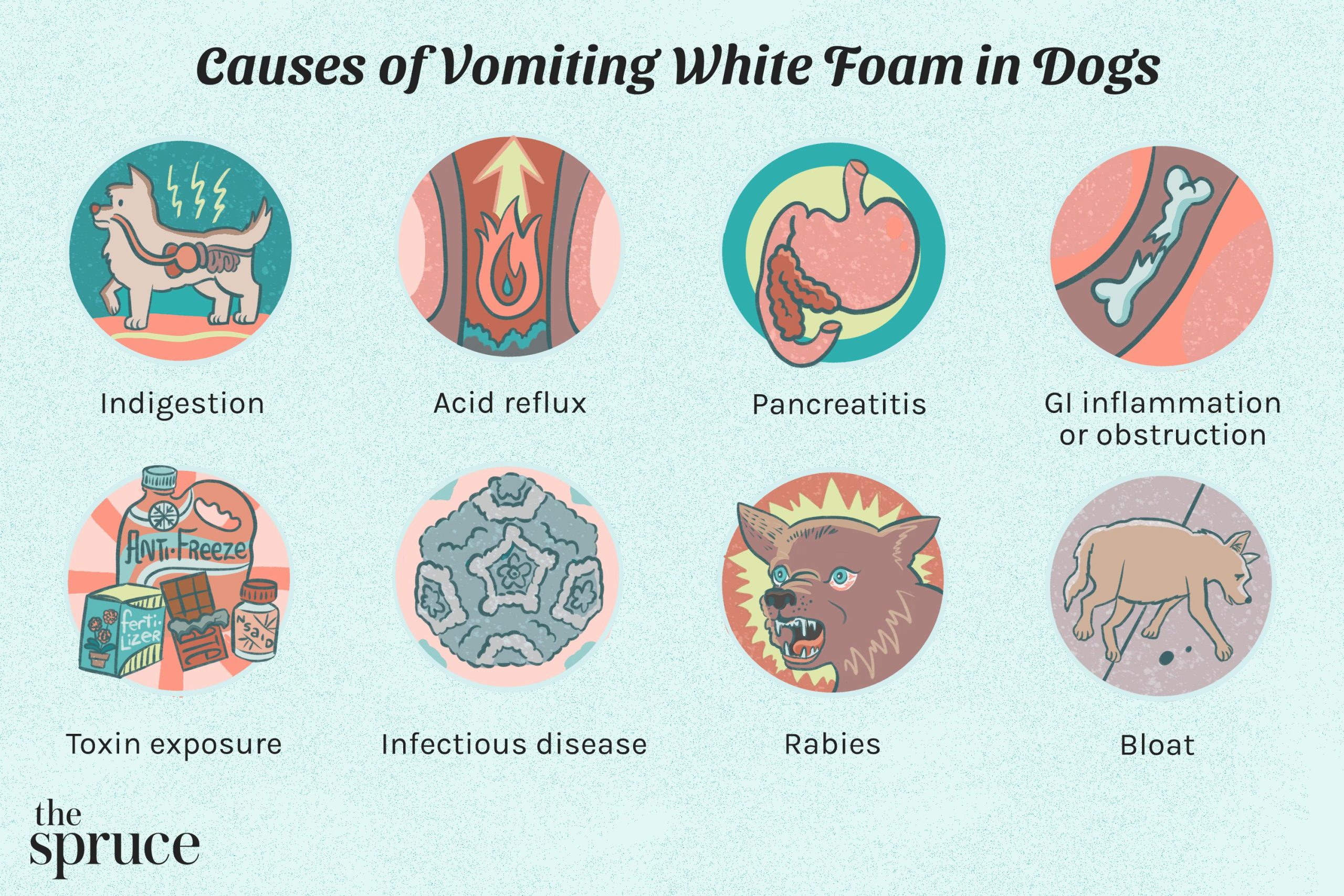If your dog is throwing up daily but acting normal, it could be due to chronic gastritis or food indiscretion. Chronic gastritis is inflammation of the stomach, while food indiscretion occurs when dogs eat too quickly or too much.
It’s important to monitor your dog’s vomiting and look for any additional symptoms or signs of distress. If your dog has ingested something toxic or if there is blood in their vomit or stools, it’s time to consult with a veterinarian.
Continuous retching without anything coming up is also a cause for concern. Persistent or chronic vomiting in dogs may indicate an underlying disease or health issue and should be evaluated by a professional.
Causes Of Dog Vomiting
If you’ve ever witnessed your furry friend throwing up, you know how distressing it can be. But don’t worry; there are various reasons why dogs vomit, and most of them have simple solutions. Let’s explore some common causes of dog vomiting that you need to be aware of:
Food Indiscretion
One possible cause of dog vomiting is food indiscretion. This occurs when dogs get overly excited about eating and end up consuming too much too quickly. As a result, their stomachs can’t handle the excess food, leading to regurgitation. It’s a common occurrence, especially in dogs with hearty appetites.
To prevent food indiscretion in your furry friend, consider feeding smaller meals throughout the day, rather than one large meal. This can help regulate your dog’s eating habits and reduce the chances of vomiting due to food indiscretion.
Chronic Gastritis
Another possible cause of dog vomiting is chronic gastritis, which refers to inflammation of the stomach lining. This condition can be triggered by various factors, including infection, food allergies, or even immune system disorders.
If your dog is experiencing chronic gastritis, they may vomit frequently, even if they appear otherwise healthy and normal. It’s essential to consult your veterinarian if you suspect chronic gastritis in your dog, as they can provide the appropriate diagnosis and treatment plan.
To help manage chronic gastritis in dogs, your veterinarian may recommend a special diet or prescribe medication to reduce inflammation and soothe your dog’s stomach.
In conclusion, dog vomiting can be caused by various factors, including food indiscretion and chronic gastritis. Understanding these common causes can help you identify the underlying issue and seek appropriate treatment. Remember, if your dog is vomiting frequently or showing other concerning symptoms, it’s best to consult with a veterinarian for a proper diagnosis and guidance.

Credit: www.purina.co.uk
When To Be Concerned
If your dog is throwing up daily, it’s important to pay attention to certain signs that may indicate a more serious issue. While occasional vomiting is not uncommon in dogs, chronic vomiting can be a cause for concern. Here are a few situations when you should be worried:
Foreign Body Or Poisoning
If you suspect that your dog has ingested a foreign object or something toxic, it’s crucial to seek veterinary attention immediately. Foreign bodies, such as toys, bones, or even certain plants, can cause obstruction or internal damage. Similarly, poisoning from chemicals, medications, or certain foods can be life-threatening and require immediate treatment.
Presence Of Blood
If you notice blood in your dog’s vomit or stools, it is a red flag that something is wrong. Blood can indicate various issues, including gastrointestinal bleeding or an underlying condition. Contact your vet right away if you observe any signs of blood in your dog’s vomit or stools.
Frequent Vomiting
While an occasional bout of vomiting may not be a cause for alarm, frequent vomiting can be a sign of an underlying health problem. If your dog is throwing up daily or multiple times a day, it’s essential to consult with your veterinarian. Chronic vomiting can be a symptom of conditions like pancreatitis, colitis, or food allergies, which require medical intervention.
Continuous Retching
If your dog is continuously retching or attempting to vomit but nothing comes up, it could indicate an urgent situation. This unproductive retching may suggest gastric torsion, or bloat, which is a life-threatening condition that requires immediate veterinary attention. Other potential causes include gastrointestinal obstruction or severe inflammation.
Remember, if you ever have concerns about your dog’s health, it’s always best to seek professional advice from your veterinarian. They can provide the necessary guidance and recommend appropriate treatment based on your dog’s specific situation.
Chronic Vomiting
If your dog is throwing up daily but acting normal otherwise, it could be due to chronic gastritis or food indiscretion. Chronic vomiting in dogs may indicate an underlying disease, and it is recommended to consult with a veterinarian if your dog shows signs of frequent vomiting or ingests something poisonous.
Indicative Of Underlying Disease
Chronic vomiting in dogs is not to be taken lightly, as it is often indicative of an underlying disease or health issue. While occasional vomiting may be considered normal, persistent and frequent vomiting should raise concerns and prompt a visit to the veterinarian. Some of the common causes of chronic vomiting in dogs can include pancreatitis, parasites, bloat, cancer, food allergies, colitis, gastroenteritis, intestinal infections, and even heatstroke. These conditions can cause inflammation of the stomach and intestinal tract, leading to recurring episodes of vomiting.Evaluating The Diagnostic Approach
When faced with a dog that is throwing up daily, it is crucial to take a comprehensive approach to diagnose the underlying cause. The veterinarian may start by conducting a thorough physical examination to check for any signs of discomfort or abnormalities in the abdomen. Bloodwork and X-rays may also be ordered to assess organ function and detect any abnormalities. In some cases, additional diagnostic tests such as ultrasound, endoscopy, or biopsies may be necessary to gather more information about the dog’s condition. This approach helps identify the specific cause of chronic vomiting and enables the veterinarian to develop an appropriate treatment plan.Treatment Options
The treatment for chronic vomiting in dogs depends on the underlying cause. In some instances, medication and dietary changes may be sufficient to manage the condition. For example, if food allergies are the cause, an elimination diet may be recommended to identify and avoid trigger ingredients. In more severe cases, surgery may be necessary to address complications such as intestinal blockages or tumors. Chemotherapy or radiation therapy may also be considered if cancer is diagnosed as the underlying cause of chronic vomiting. It is essential to work closely with your veterinarian to determine the most effective treatment approach for your dog’s specific condition. With proper diagnosis and management, it is possible to alleviate chronic vomiting and improve your furry friend’s quality of life.Conclusion
Chronic vomiting in dogs should never be ignored, as it often signifies an underlying disease or health issue. Seeking prompt veterinary attention is crucial to diagnose the cause and develop an appropriate treatment plan. Remember, your furry companion relies on you to advocate for their health and well-being, so trust your instincts and consult a veterinarian if your dog is throwing up daily.
Credit: www.whole-dog-journal.com
Acute Vomiting In Dogs
If your dog is throwing up daily but behaving normally, it could be due to chronic gastritis or food indiscretion. Chronic vomiting in dogs is usually a sign of an underlying disease, so it’s important to consult a veterinarian for proper diagnosis and treatment.
## Acute Vomiting in Dogs ### Ingesting Irritating Substances Dogs are known for their curious nature, and sometimes this curiosity can lead them to ingest substances that can irritate their stomachs. Common examples include garbage, toxic plants, or even chocolate. When dogs ingest these irritating substances, it can cause acute vomiting as their bodies try to expel the offending substance. If you suspect that your dog has ingested something harmful, it’s important to contact your veterinarian immediately. ### Toxins or Poisons In addition to irritating substances, certain toxins or poisons can also lead to acute vomiting in dogs. This can include household chemicals, medications, or even certain foods that are toxic to dogs like grapes or onions. It’s crucial to be vigilant about keeping harmful substances out of your dog’s reach and seeking veterinary assistance if you suspect poisoning. ### Pancreatitis Another potential cause of acute vomiting in dogs is pancreatitis. This condition occurs when the pancreas becomes inflamed, leading to severe abdominal pain and digestive issues. Dogs that consume high-fat diets or have a history of pancreatitis are more prone to developing this condition. If you notice frequent vomiting accompanied by lethargy and a decrease in appetite, pancreatitis should be considered as a possible cause. ### Kidney Failure Kidney failure can also manifest as acute vomiting in dogs. The kidneys play a vital role in filtering toxins and waste products from the bloodstream. When they fail to function properly, toxins build up in the body leading to nausea and vomiting. Dogs with kidney failure may also exhibit other symptoms like increased thirst, frequent urination, and weight loss. Immediate veterinary attention is necessary for diagnosis and treatment. ### Liver Problems Liver problems can cause dogs to experience recurrent vomiting. The liver plays a crucial role in detoxifying the body and aiding in digestion. When the liver is compromised, it can lead to a buildup of toxins and abnormalities in the digestive process. Liver disease in dogs can be caused by various factors, including infections, toxins, or genetic conditions. If your dog is vomiting frequently and displaying signs of liver dysfunction such as jaundice or a distended abdomen, consult your veterinarian for a proper diagnosis. In conclusion, acute vomiting in dogs can stem from a variety of causes, from ingesting irritating substances to more serious conditions like kidney failure or liver problems. It’s essential to monitor your dog’s behavior closely and seek veterinary attention if you notice persistent or severe vomiting. Prompt diagnosis and treatment can help alleviate discomfort and ensure the well-being of your furry companion.Causes Of Chronic Vomiting
Dogs may vomit occasionally, but when it becomes chronic, it could be a sign of an underlying health issue. Understanding the specific causes of chronic vomiting in dogs is crucial in order to provide them with appropriate treatment and care. Here are the common culprits:
1. Parasites
Parasites are an unwelcome presence in your dog’s digestive system and can cause chronic vomiting. Common parasites such as roundworms, hookworms, and giardia can irritate the gastrointestinal tract and lead to persistent vomiting. Regular deworming and preventive measures can help keep parasites under control.
2. Food Sensitivity
Food sensitivity or intolerance can trigger chronic vomiting in dogs. Some dogs have difficulty digesting certain ingredients, such as grains or lactose, leading to gastrointestinal upset. Switching to a hypoallergenic or limited ingredient diet can help identify and alleviate food sensitivities, effectively reducing vomiting episodes.
3. Diseases Or Health Issues
Dogs with chronic vomiting may have an underlying disease or health issue that needs attention. Some commonly observed diseases or health conditions associated with chronic vomiting in dogs include:
- Pancreatitis: Inflammation of the pancreas, which can lead to recurrent vomiting and abdominal pain.
- Bloat: A life-threatening condition characterized by a twisted stomach, causing persistent vomiting and abdominal distension.
- Cancer: Tumors in the gastrointestinal tract can cause chronic vomiting as a symptom.
- Food allergies: Similar to food sensitivity, certain ingredients in the dog’s diet can trigger an allergic reaction, leading to vomiting.
- Colitis: Inflammation of the colon, often resulting in chronic vomiting and diarrhea.
- Gastroenteritis: Infection or inflammation of the stomach and intestines, causing vomiting and diarrhea.
- Infections: Bacterial, viral, or parasitic infections can lead to chronic vomiting in dogs.
- Heatstroke: Heat exhaustion or overheating can cause vomiting and other symptoms of distress.
It is essential for dog owners to monitor their pets for any signs of chronic vomiting and consult with a veterinarian to determine the underlying cause. Diagnostic tests, including blood work and imaging, may be necessary to pinpoint the precise condition and develop an effective treatment plan. Prompt veterinary care can help alleviate your dog’s discomfort and improve their overall health.

Credit: www.dogsnaturallymagazine.com
Frequently Asked Questions Of Dog Throwing Up Daily
Why Is My Dog Throwing Up Everyday But Acting Normal?
If your dog is throwing up every day but acting normal, it could be due to chronic gastritis or food indiscretion. Chronic gastritis is inflammation of the stomach, while food indiscretion occurs when dogs eat too fast or too much.
If your dog shows any concerning signs or symptoms, such as ingesting something toxic or vomiting frequently, it’s best to consult a veterinarian.
When Should You Be Concerned About Your Dog Throwing Up?
If your dog throws up but is otherwise acting normal, it may be due to chronic gastritis or food indiscretion. Food indiscretion is common when dogs eat too fast or too much. However, if your dog shows signs of ingesting something harmful, has blood in their vomit or stools, or vomits frequently, it’s time to call your vet.
Chronic vomiting can indicate an underlying disease.
What Should I Do If My Dog Throws Up Everyday?
If your dog is throwing up every day but acting normal, it could be due to chronic gastritis or food indiscretion. Chronic gastritis is inflammation of the stomach, while food indiscretion occurs when dogs eat too fast or too much.
However, if your dog is continuously vomiting, ingested a foreign body, or has blood in their vomit or stools, it’s important to call your vet.
Conclusion
If your dog is consistently throwing up but still acting normal, it could be due to chronic gastritis or food indiscretion. Chronic vomiting in dogs may indicate an underlying disease or sensitivity. It’s important to pay attention to other signs, such as the presence of blood or frequent vomiting, and consult a veterinarian if necessary.
Taking preventative measures, like feeding your dog slowly and monitoring their diet, can help reduce the chances of vomiting. Remember to seek professional advice if you’re concerned about your dog’s vomiting habits.




